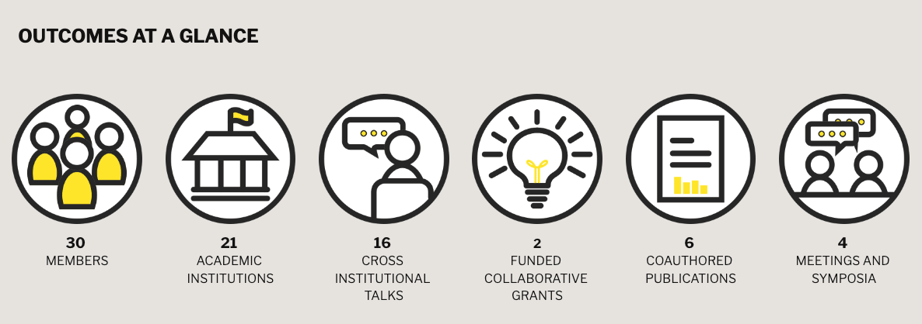For many researchers, the end of a post-doctoral fellowship and entry into a junior faculty position can be a time without a map.
As a trainee, there are opportunities for mentorship and networking, and senior faculty members often have tenure, an established lab, connections, and experience. But for early- and mid-career researchers, resources, mentorship, and support may not be as readily found.
In 2017, Matt Sikora, PhD, University of Colorado Cancer Center member, and several colleagues began discussing the gap between training and senior positions in which they all were working
“We were talking about how folks at our career stage are left in a lurch,” explains Sikora, an assistant professor of pathology in the CU School of Medicine whose research focuses on breast cancer. “We’re not really taught how to be principal investigators (PIs), how to run a lab, we’re just handed the keys to the lab and told to have a good time. We’re trained in science, but not in budget management, personnel management, hiring, all the things that support doing science.”
The next year, Sikora and his colleagues Zeynep Madak-Erdogan, PhD, and Becca Riggins, PhD, began discussing how they could develop a “think tank” meeting for early- and mid-career scientists studying nuclear receptors in their many forms. With that aim, they formed NR IMPACT to focus on discussion and development of new interdisciplinary projects and collaborations, as well as support discussion of career development and science policy challenges facing their cohort of researchers.
Some research collaborations have included a study of TLX, an orphan nuclear receptor with emerging roles in physiology and disease, and research focusing on endocrine-disrupting chemicals and breast cancer.
This week, NR IMPACT held IMPACT22, its first in-person annual meeting at the University of Utah Huntsman Cancer Institute. The meeting addressed not only ongoing and big ideas in research, but topics such as developing grant proposals and responding to research reviewer comments.
“We purposely tried to avoid a typical conference agenda and focused instead on continuing to build these networks that have grown from the ground up,” Sikora says.
Similar experiences as early-career faculty
When starting this group, Sikora and his colleagues discussed research, but quickly realized that they were sharing similar experiences as early-career faculty members.
“Just from the social aspect, I don’t think people anticipate that being a new PI is really isolating,” Sikora says. “One day you’re friends with all the techs and post-grads in the lab, and the next day you’re not and can’t be. You lose that certain type of connection you can make with more junior staff in the lab, yet at the same time as an assistant professor you also aren’t really on the same plane as senior professors. It can be an incredibly isolating experience, so between that and COVID I think a lot of us were losing our minds.”
In March 2019, Sikora, Riggins, and Madak-Erdogan established NR-IMPACT and reached out to colleagues across the United States who were in early- and mid-career faculty positions and focusing on nuclear receptor research, which relates to transcription factors that regulate many biological processes, including metabolism, cell growth and development, and reproduction. They began planning for a conference in 2020 and applied for grant support, but their plans for an in-person meeting were derailed by COVID-19.
“We ended up really benefitting from a shift to virtual because we met through webinars, which evolved to regular chatter on Slack,” Sikora says. “We started with 25 members because we wanted to have a manageable number for webinars and also keep it more personal so we could build this support and these relationships.”
Some highlighted NR IMPACT accomplishments.
Through more than two years of meeting virtually, members of NR IMPACT not only discussed ideas and research, but the practicalities of being a PI and running a lab. Sikora and his colleagues were inspired by an informal group of women who are senior professors “who have been mentors for many of us,” he says. “They have their own unofficial group and they’re really a support for each other, so we used that as inspiration, these women in senior positions supporting each other behind the scenes to break the old boys’ club.”
Connecting with people who understand
Sikora and his NR IMPACT colleagues – who include CU Cancer Center researchers Diana Cittelly, PhD, Katja Kiseljak-Vassiliades, DO, and Neel Mukherjee, PhD – are discussing how to maintain NR IMPACT’s aim of supporting early- and mid-career researchers while planning for the inevitable “aging out” of the group.
“We have to acknowledge that we’re going to be senior faculty someday,” Sikora says. “As much as we like the peer support, we’ve also become friends and there’s a lot to be said for talking science with friends. So, that’s been on our to-do list for IMPACT22, how we start building post-doc outreach efforts to roll these folks into the network so there’s a continuity. And then maybe we’ll be the old-guard advisors, but we’re still figuring that out.”
NR IMPACT has received support from the CU Cancer Center, among others, as members pursue goals of developing collaborative research projects, developing leadership and management skills, balancing professional relationships, and engaging patients, advocates, and clinicians.
“I think besides having that science core and a group of friends you can talk shop with,” Sikora says, “one of the unexpected benefits of NR IMPACT is that social touchstone. It’s really powerful to connect with people who understand what you’re experiencing.”




